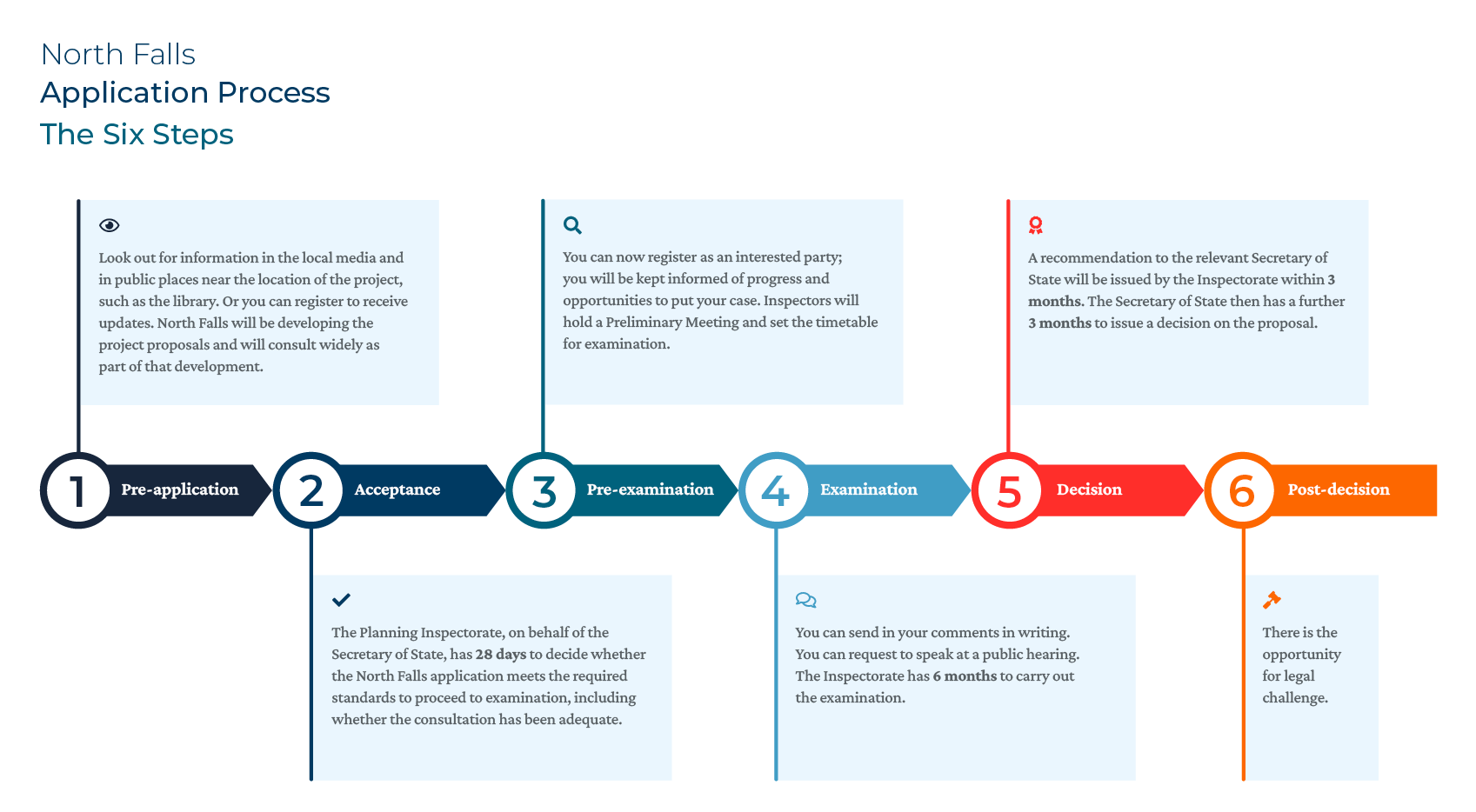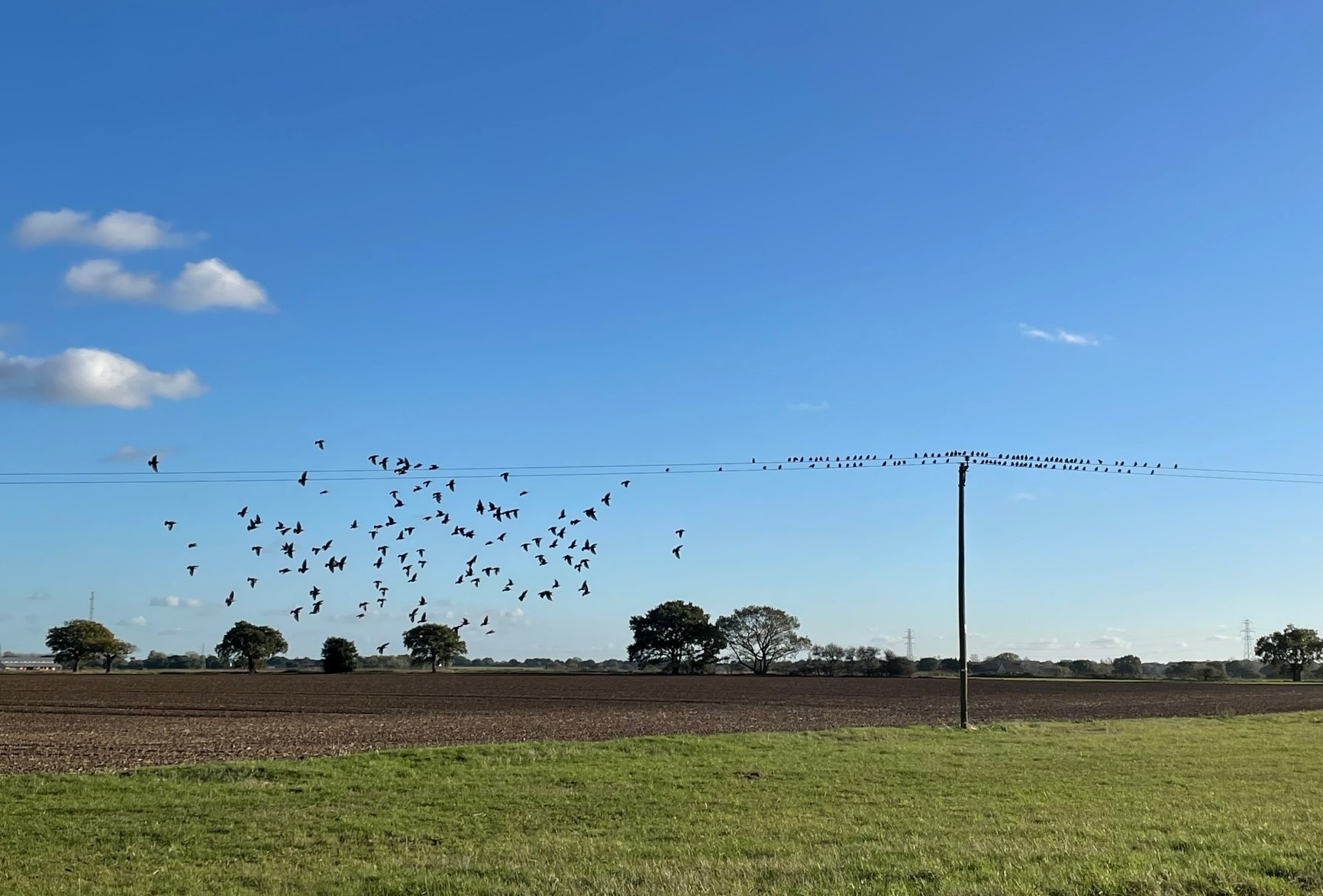The information on this page was correct at the time of publishing (December 2022). The project has since evolved and we would encourage you to read our September update for more information.
Developing North Falls
Nationally significant infrastructure project
As a nationally significant infrastructure project (NSIP), North Falls must be consented under the Planning Act 2008 development consent process, which was introduced to streamline the decision-making for such projects.
Applicants, such as North Falls, must go through this process to gain permission to build and operate their NSIP. The permission is called a development consent order (DCO). The government agency responsible for examining and making recommendations on applications for NSIPs is the Planning Inspectorate.
The final decision on the application will be made by the Secretary of State for Business, Energy and Industrial Strategy (BEIS).


The National Infrastructure Planning process
The Planning Act 2008 introduced a process to streamline the decision-making for major infrastructure projects like North Falls, to make it fairer and faster for communities and applicants alike. See diagram above. You can also visit the PINS website which provides more information on the planning process.
Pre-application phase
North Falls is now in the pre-application phase, which runs until its development consent order (DCO) application is finalised and submitted to the Planning Inspectorate. This is the key period for local communities to input into the shaping of the project proposals. For North Falls this phase will run until application submission in 2024.
Environmental impact assessment (EIA)
The core of our current work during this pre-application phase is carrying out an environmental impact assessment (EIA). The EIA is a systematic and iterative approach to assessing the environmental, social and economic effects arising from our proposals. It will set out mitigation measures to reduce adverse impacts plus the results of further assessments with these mitigation measures applied.
The EIA provides a consistent approach to both the onshore and offshore development proposals.
Throughout this phase there is ongoing technical design and engineering work to ensure the project is deliverable.

Scoping Report
North Falls prepared a Scoping Report and requested a scoping opinion from the Secretary of State during 2021, as the first stage of the EIA process. The North Falls Scoping Report outlined the receptors that will be considered during the EIA and the proposed data gathering and methodology employed to characterise the existing environment; assess potential impacts; and develop mitigation measures. This document provides high level information which will be expanded on during consultation with technical stakeholders throughout the EIA process.
A Scoping Opinion was adopted by the Secretary of State in August 2021 and can be found on the North Falls website as well as on the project page of the Planning Inspectorate's website, along with other documentation related to the project, at: https://infrastructure.planninginspectorate.gov.uk/projects/eastern/north-falls-offshore-wind-farm/?ipcsection=docs
The feedback received on this report from the relevant local planning authorities and statutory consultees resulted in a scoping opinion which is available to read here.
Preliminary Environmental Information Report (PEIR)
The Scoping Report is now being followed by a Preliminary Environmental Information Report (PEIR), which is a technical document covering the full range of every element that has been considered to date, its potential impacts and proposed mitigations.
Since our previous consultation we have focussed on the content of this report and we are now seeking feedback on this work from local communities and relevant stakeholders, including local planning authorities and statutory nature conservation bodies, prior to completing the first draft this report.
The PEIR will form the basis of next year's statutory consultation on our proposals and will provide a status on the project's EIA process and on the progress of the preparation of the development consent application.
Feedback given on the PEIR will be used to produce the final document required for the application, the Environmental Statement.
Feedback Questions
It was stated that the PEIR needs to be well-considered, take a long-term perspective and be reviewed externally. There was the call for greater cooperation with Five Estuaries (see also next question), for cumulative impacts to be included and for all materials to be made available online. There were concerns around how local comments will be incorporated and whether the information in the report would be either insufficient or that decisions have already been made. This question also received a very specific request to replace cast iron water main near Thorpe-le-Soken.
Environmental Statement (ES)
The Environmental Statement (ES) will be the final output of the EIA undertaken by the North Falls project team, and it will be an evolution of the PEIR. It will incorporate the results of the surveys and assessments, technical details as well as the outcomes of responses from our consultations.
The ES will also describe any changes made to the project proposals since PEIR and the mitigation measures that will be implemented and will form a key part of the submitted DCO application. This document will accompany the final application when it is submitted to the Planning Inspectorate.
Consultation
Consultation is a key element of the pre-application development process and is crucial to the progress of the EIA. The project team will ensure that stakeholders are engaged in the development and have the opportunity to comment on the proposals at key decision-making points.
The preparation and refinement of the North Falls proposals continues to be an iterative process. Feedback is received, considered and relevant changes made in a step-by-step approach. Anyone with comments or suggestions about the project can provide input throughout the development phase. However, pre-application consultation periods, such as this current consultation, will provide the best opportunity for stakeholders to review the plans, provide comments, submit feedback and, importantly, have an influence on parts of the process or shape of the project.
At these defined consultation periods North Falls will ask for input related to specific elements of its proposals where stakeholders - particularly those with key local knowledge - will be able to offer valuable insights. These insights will be carefully considered by the project team and incorporated as feasible.